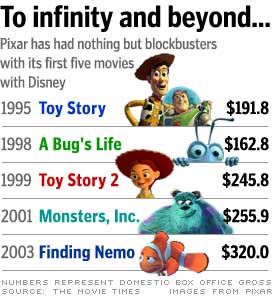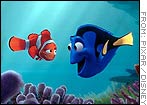NEW YORK (CNN/Money) -
Few Hollywood marriages have been as successful, or as closely watched, as that between Pixar Animation Studios and Walt Disney Co.
But like so many high-profile Hollywood couplings, this 12-year-old combination is on the rocks right now, despite more than $1.1 billion in ticket sales running from "Toy Story" to "Finding Nemo."

Pixar CEO and Chairman Steve Jobs said the animated film maker has been talking to other potential partners. Although it would prefer to stay with Disney, he said Pixar will make the move if that's what's needed to get the deal it wants.
"We've talked to many of these studios and we know we can get the deal we want," Jobs said.
A decision is not imminent. Jobs said Thursday the right deal is more important than a quick deal. Both Pixar and Disney executives have been talking for months about the desire to negotiate a new deal and have started early work on two movies that are to come after the Disney deal expires.
 |
|
| "Finding Nemo" has set a record for top U.S. box office for an animated movie. |
Pixar has been paying Disney a distribution fee and then splitting the remaining profit on Pixar's first five movies. That includes this summer's top-grossing picture, "Finding Nemo," which set a domestic box office record for an animated movie as it reached $320 million, as well as past successes "A Bug's Life" and "Monsters, Inc."
Thursday, the company reported that second-quarter earnings nearly doubled to $19.5 million, or 34 cents a share, from $10.4 million, or 20 cents, a year earlier. That easily beat the consensus analyst forecast of 22 cents, and even the 28 cent a share forecast analysts had before Pixar executives issued relatively conservative guidance three months earlier.
Revenue more than doubled to $48.9 million from $22.8 million a year earlier, when the DVD of "Monsters, Inc." was driving most sales. Perhaps more importantly for the company's negotiations with Disney, it now has $502 million in cash and cash equivalents on its balance sheet, up from $57 million just three months earlier. It also has no debt.
That position gives Pixar the resources to make future films without the 50 percent cash infusion it has gotten from Disney on "Monsters", "Bug's Life" and "Nemo." Pixar executives Thursday again expressed their desire to strike a new deal that would let them keep all the profit from future pictures when the current five-picture deal with Disney runs out after two more movies, likely by 2005.
Disney executives say they want a new deal. But analysts doubt they'd be interested in one along the limited basis that Pixar executives want to see, in which Pixar would pay only a distribution fee and keep all of the profit.
"Say they pay a distribution fee of 9 or 10 percent. Yes, that's $30-some million for 'Nemo.' But is Disney going to waste time administering such a deal in future? Our opinion is no," said David Miller, analyst with Sanders Morris & Harris, earlier in the week ahead of Thursday's analysts' conference call.
But Miller and many other analysts think the two sides will reach an agreement. Miller sees a deal that will give Pixar 70 percent or maybe even 80 percent of the profit of future films, including "The Incredibles" due out in November 2004 and "Cars," now slated for release in late 2005, both under the current Disney-Pixar deal.
"The simple fact of life is this deal works," analyst Dennis McAlpine of independent research firm McAlpine Associates, said earlier in the week. "Why screw it up? Why should Pixar go to Fox or Warner or anyone who might make a mess out of it? And I don't see any way that Disney would give up all that money."
Mine! Mine! Mine!
Disney Chairman and CEO Michael Eisner told analysts earlier this summer he expects some kind of deal to be reached, although he concedes it will not be as lucrative to Disney as the existing agreement.
Both Eisner and Jobs have some leverage in talks, although Pixar probably has the better hand, especially with its track record and its strong cash position. But under the current deal, Disney would have the rights to make its own sequels to Pixar's successful first five films, as well as its next two movies.
| Related stories
|

|
|
|
|
"Those are the kinds of threats they can each wave at each other, but you don't want to actually hit the other guy with it," McAlpine said.
Despite the strong financial results, shares of Pixar (PIXR: Research, Estimates) stock closed after-hour trading on Instinet down $1 to $64.56, following a decline of $1.94 a share during the day. Part of the decline may have been concern over Jobs' comments on finding a new partner, but part also could be due to the belief that gains in the stock since the opening of "Nemo" have made it too pricey. Miller has only a "hold" recommendation on the stock, due to its current valuation.
Even with Thursday's after-hours decline, Pixar stock is up about 17 percent since "Finding Nemo" opened, breaking the trend of only short-term rises during the run of its previous movies. Part of that continued rise in the stock could be expectation that Pixar and Disney will reach a deal that would improve Pixar's future results. But it also could just be "Nemo" beating expectations so soundly, raising hopes for its future films.
Click here for a look at media and entertainment stocks
"You sort of become accustomed in this business to the notion that failure is imminent," Miller said. "No one bats 1.000. It's like baseball -- you miss 66 percent of the time and you're still a star. But with these guys, the market right now is assuming that Pixar will continue to bat 1.000."

|

